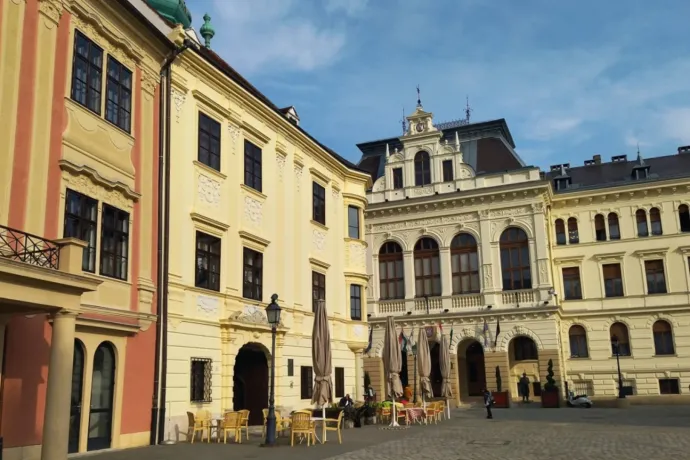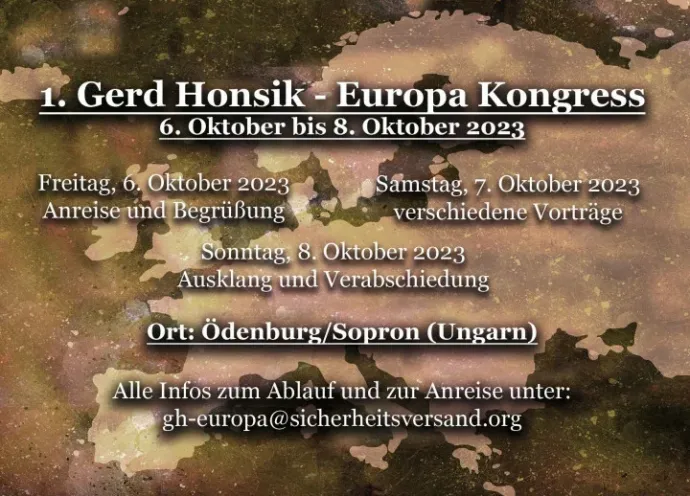
A three-day networking congress of European neo-Nazi organisations is scheduled to take place in Sopron from 6 October. Locals are organising protests, while the mayor has issued a statement clarifying that there is zero tolerance for all forms of anti-Semitism. All the while, hoteliers are explaining themselves to their guests, saying that they are not aware of any such event.
The Austrian press had already reported in May that Europe's neo-fascists were organising their 1st Gerd Honsik European Congress in Sopron, but the news blew the fuse in the city this week after an anti-fascist blog post about it appeared online. The residents of Sopron were practically united in their outrage, with the unexpected event even bringing the city's Fidesz leadership together with the opposition in saying that
they don't want fascists in the city!
There is little precedent for a similar consensus. But what are neo-Nazis doing in Sopron? This is not the first time since the regime change that they have chosen to meet in the city. In the early 2000s, they met at a "musical gathering" in Harka, near Sopron. Moreover, the man after whom the far right named their congress, Gerd Honsik, had lived in the town for years.
Who was Gerd Honsik?
Gerd Honsik's father died in WWII, and his mother raised him in a "patriotic spirit". He was, in fact, considered one of Austria's best-known Holocaust deniers. The Austrian neo-Nazi was jailed several times. He stopped at nothing: he threw Molotov cocktails, wrote a book exonerating Hitler, and even wrote an open letter, calling on the Arab world to facilitate the uncovering of the 'the greatest propaganda hoax in world history, the gassing of the Jews'.
At the age of 70, he was released early from his last prison sentence, and shortly afterwards moved to Sopron, Hungary. The city's proximity to the border and Vienna may have prompted his choice, and he died there in 2018. His memory – it seems – lives on.
A congress for network expansion
The 1st Gerd Honsik – European Congress, organised by Austrian neo-Nazis, aims to widen their European network. The meeting plans to bring together Italian, Austrian, German and Scandinavian groups to discuss topics such as European unity, Europe's past struggles for freedom, national movements and their respective perceptions.

In May, Der Standard reported that Hungary was considered a safe venue by the organizers. It is not clear what this was based on, although at the time the Hungarian press was full of reports that the neo-Nazi martial arts gala, European Fight Night would be held in the Hungarian capital. There was great pressure about that event at the time as well, so the venue had to be changed. The location was changed to Csókakő, because the local authorities didn't know what and who they had agreed to host.
Another reason why Hungary may be considered a friendly location is because of the international meetings of the Day of Honour (Tag der Ehre in German). Every year in February, the European Nazis hold an international meeting (considered important by them) in Buda Castle, where far-right groups commemorate the joing breakout attempt of Hungarian and German troops on 11 February 1944.
By invitation only
Registration for the congress in Sopron was open until 22 September and the invitation was available on a Telegram channel called Infokanal Deutschösterreich. The exact location of the meeting, which is scheduled from 6 October to 8 October, is only revealed to those who buy a ticket, at the price of €25 per person. The site is no longer available.
Several hotels in Sopron complained that they keep having to explain themselves: no, they were not aware of a neo-Nazi conference on their premises on 6 October.
The opposition parties are also trying to find out the location. Momentum has already announced that it will protest in front of the conference venue – if, of course, it becomes known where the event will be held, and if it will be held at all.
The police have not yet responded to press inquiries on the matter, other than to say that they will respond within the timeframe set by law. The mayor of Sopron, however, has issued a statement – he had to, after protests had already been organised in front of the town hall. The outraged residents, who fear for their city, wanted to send a message to the municipal authorities: there is no place for neo-fascist rallies here!
Naturally, the organisers of the congress did not seek permission, as Mayor Ciprián Farkas has made clear. It is much more likely that Europe's neo-fascists will meet on a private property, which will make it harder for the authorities to act lawfully.
The mayor's statement, however, “rejects in the strongest possible terms any political activity, whether far left or far right, which incites fear among the people of Sopron. There is zero tolerance for all forms of anti-Semitism in Sopron, as in Hungary.”
Why Sopron?
The explanation is most likely the proximity of the border, or more precisely the borders, as Bratislava is just over an hour away and Austria only a few minutes away. But as the vehement reactions of the locals make clear, they feel the city did not deserve to be associated with the neo-fascists again.
They weren't glad about making the headlines because of Horst Mahler a few years ago either. Gerd Honsik wasn't the only one to find refuge here. German Holocaust denier Horst Mahler was arrested in Sopron in 2017. The then 81-year-old German man was the founder of the far-left terrorist group Red Army Faction (RAF) and later became a far-right activist.
In 2009, he was sentenced to 10 years in prison in Germany for Holocaust denial, but this was commuted to a suspended sentence in 2015 due to his health. He was supposed to return to prison in 2017, but escaped from the German authorities instead. He bought a house in Sopron and lived there peacefully until he was arrested on a European arrest warrant. He was later extradited to the Germans, despite having requested political asylum from Viktor Orbán, or as he put it, "the Führer of the Hungarian people".
For more quick, accurate and impartial news from and about Hungary, subscribe to the Telex English newsletter!